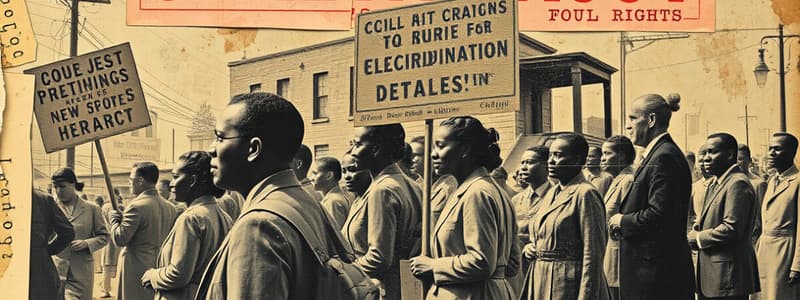Podcast
Questions and Answers
What did the Civil Rights Act of 1964 do?
What did the Civil Rights Act of 1964 do?
Effectively outlawed egregious forms of discrimination against African Americans and women, including all forms of segregation.
What did the Civil Rights Act of 1964 terminate in society?
What did the Civil Rights Act of 1964 terminate in society?
Voter registration requirements (literacy tests) and all forms of racial segregation in schools, workplaces, and public facilities.
Was the Civil Rights Act of 1964 initially enforced?
Was the Civil Rights Act of 1964 initially enforced?
False (B)
How did Congress enforce the Civil Rights Act of 1964?
How did Congress enforce the Civil Rights Act of 1964?
What did Title I of the Civil Rights Act of 1964 do?
What did Title I of the Civil Rights Act of 1964 do?
What did Title II of the Civil Rights Act of 1964 prohibit?
What did Title II of the Civil Rights Act of 1964 prohibit?
What did Title III of the Civil Rights Act of 1964 outlaw?
What did Title III of the Civil Rights Act of 1964 outlaw?
What was the purpose of Title IV of the Civil Rights Act of 1964?
What was the purpose of Title IV of the Civil Rights Act of 1964?
What did Title VI of the Civil Rights Act of 1964 prevent?
What did Title VI of the Civil Rights Act of 1964 prevent?
What did Title VII of the Civil Rights Act of 1964 prohibit?
What did Title VII of the Civil Rights Act of 1964 prohibit?
How did the Civil Rights Act of 1964 help women?
How did the Civil Rights Act of 1964 help women?
Flashcards
Civil Rights Act of 1964
Civil Rights Act of 1964
Effectively outlawed egregious forms of discrimination against African Americans and women, including all forms of segregation.
Civil Rights Act of 1964: Key changes
Civil Rights Act of 1964: Key changes
Terminated voter registration requirements (literacy tests) and all forms of racial segregation in schools, workplaces, and public facilities.
Enforcement of the Civil Rights Act
Enforcement of the Civil Rights Act
Through the interstate commerce clause and federal duties under the Fourteenth and Fifteenth Amendments.
Title I of the Civil Rights Act
Title I of the Civil Rights Act
Signup and view all the flashcards
Title II of the Civil Rights Act
Title II of the Civil Rights Act
Signup and view all the flashcards
Title III of the Civil Rights Act
Title III of the Civil Rights Act
Signup and view all the flashcards
Title IV of the Civil Rights Act
Title IV of the Civil Rights Act
Signup and view all the flashcards
Title VI of the Civil Rights Act
Title VI of the Civil Rights Act
Signup and view all the flashcards
Title VII of the Civil Rights Act
Title VII of the Civil Rights Act
Signup and view all the flashcards
Civil Rights Act's impact on women
Civil Rights Act's impact on women
Signup and view all the flashcards
Study Notes
Overview of the Civil Rights Act of 1964
- Outlawed major forms of discrimination against African Americans and women, abolishing segregation practices.
- Addressed unjust voter registration practices, including literacy tests.
Impact on Discrimination and Segregation
- Terminated racial segregation in schools, workplaces, and public services.
- Established federal oversight to ensure compliance across states.
Enforcement Mechanisms
- Utilized Article One, Section 8 (interstate commerce clause) for enforcing regulations.
- Relied on the Fourteenth Amendment for equal protection under the law.
- Emphasized the Fifteenth Amendment in safeguarding voting rights.
Title Provisions
- Title I: Aimed to bar unequal voter registration but did not eradicate literacy tests, which continued to disenfranchise Black voters.
- Title II: Prohibited discrimination in public accommodations engaged in interstate commerce, affecting hotels, theaters, and restaurants.
- Title III: Banned state and municipal discrimination in access to public facilities based on religion, sex, race, or ethnicity.
- Title IV: Encouraged desegregation of public schools and allowed the U.S. Attorney General to file lawsuits for enforcement.
- Title VI: Prevented discrimination in government agencies receiving federal funds.
- Title VII: Outlawed employment discrimination based on color, race, sex, national origin, or religion.
Influence on Women's Rights
- Promoted gender equality by opening up job opportunities, effectively reducing sex discrimination in the workforce.
Studying That Suits You
Use AI to generate personalized quizzes and flashcards to suit your learning preferences.




